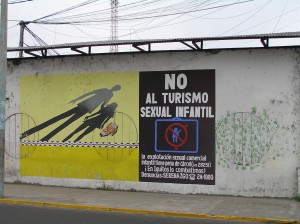Washington State Attorney General and recently elected President of the National Association of Attorney Generals (NAAG), Rob McKenna, named human trafficking as NAAG’s issue of the year. Under NAAG’s initiative, Pillars of Hope, McKenna hopes to push the issue of human trafficking into nationwide recognition.
McKenna stated that awareness of human trafficking is at a “tipping point.” With the release of Shared Hope’s Protected Innocence Report Card for Washington in early 2011, McKenna said that he and other Washington legislators have taken the problem of human trafficking as a serious issue that needs to be addressed. He hopes NAAG’s Pillars of Hope: Attorneys General Unite Against Human Trafficking will result in the American public being well-informed about human trafficking, as well as a means to prosecute traffickers and johns.
The Pillars of Hope initiative outlines a set of goals that encompass many facets in the fight against human trafficking. Under the Four Pillars of Hope, NAAG sets out to 1) increase prosecution through proper identification of traffickers, johns and victims; 2) prosecute traffickers and buyers by encouraging every state to implement the anti-trafficking statutes; 3) rescue victims by providing shelter and legal support and; 4) focus on public awareness and victim identification to reduce demand.

Pillars of Hope is an ambitious initiative that addresses a challenging dynamic in the fight against human trafficking: awareness. Days before McKenna announced Pillars of Hope, he provided remarks by video at the Protected Innocence Legislative Briefing held by Shared Hope International and hosted by the Family Research Council. This forum aimed to raise awareness of the need for anti-trafficking laws at the state level. In McKenna’s address, he referred to DMST as a “hidden problem,” but with the release of Shared Hope’s Report Card, which gave Washington a “C,” many are starting to realize the scope of this problem.
For McKenna, a “C” isn’t good enough, and he hopes Washington will one day receive straight “A’s”— leading the charge against sex trafficking. McKenna reported that awareness among legislators has already increased since Washington received this mediocre grade, as Washington passed Senate Bill 6476, which increased penalties for buyers and traffickers and offers additional protection to trafficking victims. With Attorneys General across the U.S. uniting in this effort, we can hope the goals set out by the Pillars of Hope will reduce demand, provide criminal justice tools to prosecute traffickers and johns and provide services to victims. By making human trafficking NAAG’s issue of the year, McKenna is sending a message to traffickers and johns that, in America, kids are not for sale.
 One of the
One of the  Child sex tourism
Child sex tourism However, how can attitudes truly be converted when services created to protect DMST victims carry names that are inherently accusatory? For example, in South Florida, the FBI task force, which responds to DMST victims, is called “Minor Vice Task Force.” Vice is an umbrella term for crimes involving actions considered by their very nature immoral. Thus, this title implies that the focus of this task force is minors engaging in “immoral” crimes, crimes they are forced to commit as trafficking victims. Other examples include the National Innocence Lost Task Force, which although represents a step in the right direction of viewing the trafficked minor as a victim, may be interpreted by those who are served by that force as having lost all their innocence, and still fails to maintain neutrality despite well meaning efforts. Although prostitution is legally a crime, the San Francisco Task Force on Prostitution and Vallejo Prostitution Task Force titles reinforce the idea that prostitutes are the real criminals, which perpetuates victim blaming, rather than revealing that purchasing young girls for sex as the true crime. It seems odd that the names of some human trafficking task forces would focus on the victim of the crime, considering that many other task forces, such as drug task forces, maintain a sense of neutrality about the purpose of the task force.
However, how can attitudes truly be converted when services created to protect DMST victims carry names that are inherently accusatory? For example, in South Florida, the FBI task force, which responds to DMST victims, is called “Minor Vice Task Force.” Vice is an umbrella term for crimes involving actions considered by their very nature immoral. Thus, this title implies that the focus of this task force is minors engaging in “immoral” crimes, crimes they are forced to commit as trafficking victims. Other examples include the National Innocence Lost Task Force, which although represents a step in the right direction of viewing the trafficked minor as a victim, may be interpreted by those who are served by that force as having lost all their innocence, and still fails to maintain neutrality despite well meaning efforts. Although prostitution is legally a crime, the San Francisco Task Force on Prostitution and Vallejo Prostitution Task Force titles reinforce the idea that prostitutes are the real criminals, which perpetuates victim blaming, rather than revealing that purchasing young girls for sex as the true crime. It seems odd that the names of some human trafficking task forces would focus on the victim of the crime, considering that many other task forces, such as drug task forces, maintain a sense of neutrality about the purpose of the task force. In 2008,
In 2008, 





